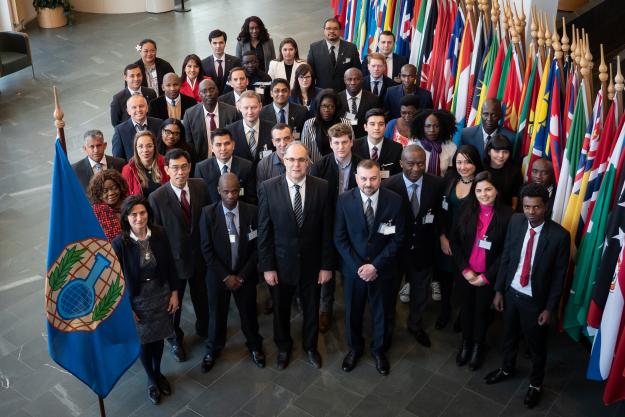
Participants at an OPCW General Training Course from 25 February -1 March
THE HAGUE, Netherlands — 27 February 2019 — State Parties enhance their knowledge and skills related to the effective implementation of the Chemical Weapons Convention (CWC), during an annual General Training Course held by the Organisation for the Prohibition of Chemical Weapons (OPCW) at its Headquarters from 25 February -1 March.
The course gathered 40 representatives from 40 States Parties, representing all five OPCW regional groups.
The training comprised presentations and practical exercises on the various aspects of CWC implementation, including State Parties national obligations, the functions and responsibilities of National Authorities, and best practices related to developing strong national relationships. Participants also had the opportunity to visit the OPCW Laboratory and Equipment Store.
Director of OPCW’s International Cooperation and Assistance Division, Mr Hamza Khelif, in the course opening remarks, emphasised the “pivotal role National Authorities play in ensuring the effective implementation of the CWC” and the importance of this capacity-building training in ensuring the exchange of scientific and technical information related to peaceful chemical activities.
The course was attended by representatives of Algeria, Angola, Argentina, Belgium, Brazil, Burundi, Cabo Verde, Cameroon, Chile, Colombia, Cote D’Ivoire, Cuba, El Salvador, Ethiopia, Georgia, Guinea-Bissau, Jamaica, Jordan, Kenya, Malaysia, Namibia, Nepal, Nicaragua, Nigeria, Peru, Poland, Samoa, Senegal, St Kitts and Nevis, Slovakia, South Africa, Sri Lanka, Tajikistan, the Republic of North Macedonia, Tunisia, Turkey, Uganda, Ukraine, Venezuela, and Zambia.
Background
The General Training Course on the CWC for Personnel of National Authorities and Relevant Stakeholders is an element of a broader educational and outreach programme offered by the OPCW to States Parties to enhance their capabilities to implement the CWC fully on a national level.
As the implementing body for the Chemical Weapons Convention, the OPCW, with its 193 Member States, oversees the global endeavour to permanently eliminate chemical weapons. Since the Convention’s entry into force in 1997, it is the most successful disarmament treaty eliminating an entire class of weapons of mass destruction.
Over 96% of all chemical weapon stockpiles declared by possessor States have been destroyed under OPCW verification. For its extensive efforts in eliminating chemical weapons, the OPCW received the 2013 Nobel Peace Prize.
